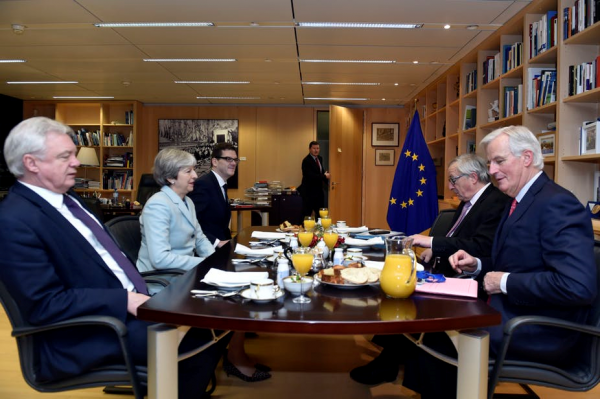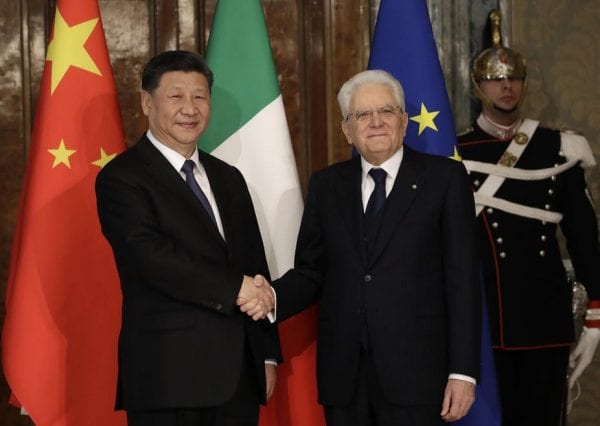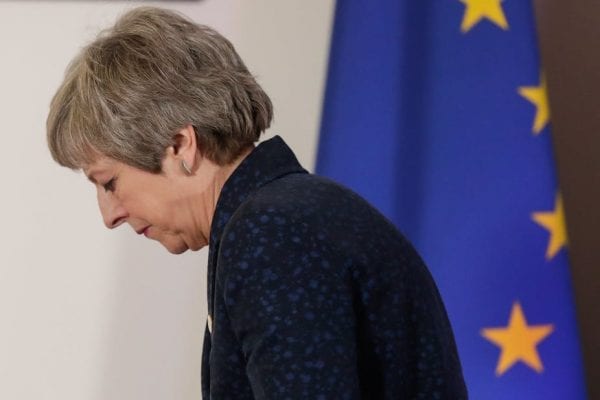The UK didn’t need the EU to enjoy multiculturalism – quite the reverse
Tag Archives: Europe
Italy joins China’s Belt and Road Initiative – here’s how it exposes cracks in Europe and the G7
China and Italy’s presidents shake hands. EPA-EFE/Alessandro Tarantino / Pool
Winnie King, University of Bristol
Italy is projected to be the first G7 nation to officially endorse China’s Belt and Road Initiative (BRI). And that’s raising the ire of both the European Union and the United States. Continue reading
Brexit deadline extended: why Brussels chose these dates and what happens now
Nieves Perez-Solorzano, University of Bristol
The 27 members of the European Union have responded to Britain’s request to extend the Brexit process with two deadlines, having agreed that the original Brexit date of March 29 is no longer feasible. Continue reading
Brexit negotiations phase two – here’s what happens next

Image: EPA/ Eric Vidal
Nieves Perez-Solorzano, University of Bristol
The European Commission will advise the leaders of the 27 EU member states meeting at the European Council on December 15 to proceed with the second phase of Brexit negotiations. It judges there has been sufficient progress on the three key issues that it insisted should constitute the first phase of talks. Those are citizens’ rights, the Irish border and the UK’s financial settlement.
That doesn’t mean that a final solution has been achieved on any of these issues – just that there is enough common understanding between the EU27 and the British government to continue to the next phase of negotiations.
So, what next? Expect more of the same: time pressures, a well-choreographed approach from the EU leadership and a weak British government gradually converging with the European position. Continue reading
The Turkish referendum thwarts civil rights struggles – in Europe and in Turkey

Dr Bahar Baser, Research Fellow at the Centre for Trust, Peace and Social Relations (Coventry University) and Associate Fellow at the Security Institute for Governance and Leadership in Africa (SIGLA) at Stellenbosch University.

Dr Aleksandra Lewicki, Postdoctoral Researcher at the Free University of Berlin and a member of the Centre for the Study of Ethnicity and Citizenship at the University of Bristol.
On Sunday, 16th April 2017, Turkish citizens are to decide in a referendum whether Turkey’s parliamentary republic will be turned into a presidential system. Representatives of the Turkish Government have been campaigning in favour of this constitutional reform in Turkey, and have also organized rallies in European countries, including Germany and the Netherlands. Although absentee voter turnout lingered at less than 10% in previous elections, the large diaspora vote can still have a detrimental impact on the results.
Some of the rallies in Europe were cancelled due to security concerns. President Erdoğan immediately associated these reactions with mounting Islamophobia across Europe. He accused German Chancellor Angela Merkel of ‘Nazi methods’ and suggested that ‘the spirit of fascism’ was ‘running rampant in Europe’. His ‘Yes’ Campaign appeals to anti-European sentiments and nourishes the “Sevres Syndrome”, whereby Erdoğan and the AKP present themselves as the alternative to those who threaten Turkey’s citizens’ interests and rights.
Chancellor Merkel, who relies on a deal with Turkey to keep the number of refugees arriving in Germany at its current low, rebuked such crude comparisons rather mildly as ‘unjustifiable’ and condemned the instrumentation of the victims of the National Socialist Regime. As national elections are coming up in September 2017, German political parties are worried of losing their voters to the right-wing populist Alternative für Deutschland (AfD), which successfully mobilized Islamophobic sentiments in 2016. Therefore, although anti-Muslim attitudes are indeed gaining in influence in Germany, initiatives to address Islamophobia hardly feature on the current Government’s political agenda or the election campaign. Continue reading
The European Parliament elections of May 2014: A truly pan-European election?

Dr Ana Juncos, Lecturer in European Politics, School of Sociology, Politics and International Studies
The next election to the European Parliament, the eighth contest since direct voting began in 1979, will take place over 22-25 May. This will be an important event in the history of the European Union. Many national elections in the past few years have witnessed governments ousted because of their handling of the economy and their support for austerity policies (namely in Greece and Cyprus, but also in France and Italy). However, this is the first time that citizens will have an opportunity to voice their opinions in a ballot on the handling of the Eurozone debt crisis at the European as opposed to the national level.

Michelle Cini, Professor of European Politics, School of Sociology, Politics and International Studies
Moreover, for the first time in its history, more than 400 million European citizens will have a chance to decide not only on the composition of the European Parliament, but also about who might become the chief of the European executive, the President of the European Commission. Even if the Commission’s role is said to be weaker than it was in the past, the incoming President will nonetheless play a key role in deciding the future direction of political and economic integration in the EU. With the entry into force of the Lisbon Treaty in late 2009, the European Council composed of the Heads of State and Government of the 28 member states now proposes a President of the Commission to the European Parliament, ‘taking into account the elections to the European Parliament’. For many this represents the first opportunity for a truly pan-European election.



